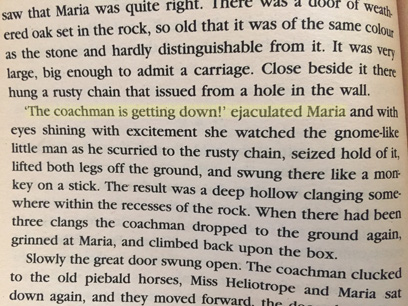I’m going to start off by telling a story from when I was 13 or 14 years old. I was with my mom and grandma in the car as we drove through the Central California countryside after a Sunday visit to my uncle’s church. As is often the case, then and now, I was reading a new book.
“Mom,” I asked, “What does ‘ejaculate’ mean?”
My Mom and Grandma shared a look in the front seat. “Beth, what are you reading?” There was a strange strain to her voice.
“This book called The Little White Horse by Elizabeth Goudge.” I held up the cover so she could see it in the mirror.
Mom and Grandma glanced at each other again. “Read the line to me,” Mom asked.
 “‘The coachman is getting down,’ ejaculated Maria.'”
“‘The coachman is getting down,’ ejaculated Maria.'”
Mom and Grandma both belted out nervous laughs. “Oh. Is it an old book?” she asked. I confirmed that it was a reprint of an old book, and I was informed I’d be told about other definitions for the word once we arrived home.
Yeah, that was a fun conversation. I was both mortified and amused. I had given them quite a fright with my choice of reading material on the way home from church! (I do recommend The Little White Horse–it’s a lovely gothic middle grade book, and apparently has gained new attention in recent years as it’s one of J.K. Rowling’s childhood favorites.)
Etymology is the history of a word, the how, when, and where of its use. I write historical fiction novels, and I find myself very aware of the words I choose. I cannot be 100% accurate to period, nor do I want to be. I will not have my characters ejaculate their speech, no matter how appropriate that word usage may have been in their time!
It’s all about balance. I want my books to be as easy to read as other current books–with contemporary concepts of paragraph size, dialogue tags, etcetera–while still keeping readers in a distant world.
I frequently check word etymologies as I write and revise. My usual go-to is the Online Etymology Dictionary; if that site doesn’t list the word, I usually resort to a Google search of “etymology [word].
There is also the dilemma of a word seeming contemporary, even though it’s not. This is referred to as “The Tiffany Problem”, named so because Tiffany is a legitimate medieval name but it looks too modern to readers of historical fiction and fantasy. For matters like that, it’s great to get feedback from other readers during early revision stages.
Sometimes, I consciously stay with an anachronistic word. For example, the word “kid” for “child” is a very recent development in the English language.
I also use the word “Reiki” to describe a form of magical healing, though Reiki as a modern practice didn’t start in Japan until the 1920s. On an additional note, my copyeditor for Breath of Earth suggested capitalizing Reiki–that’s what it said in their style guide–so I went with that in the final book. It gives it more gravitas in my 1906 setting.
Word choice does determine the tone. Within a sentence, a writer can establish the setting, time, and point of view. Be choosy. Be cautious. And be aware of what “ejaculate” means in various contexts.
Reposted from Novelocity.





